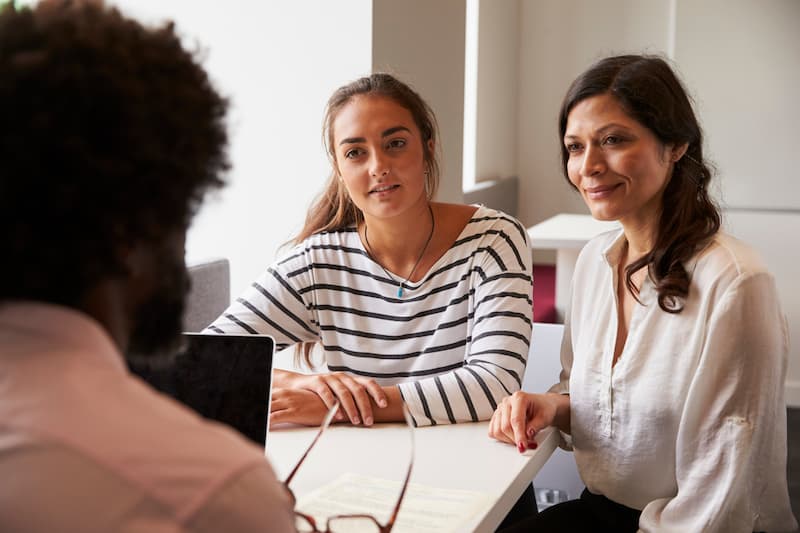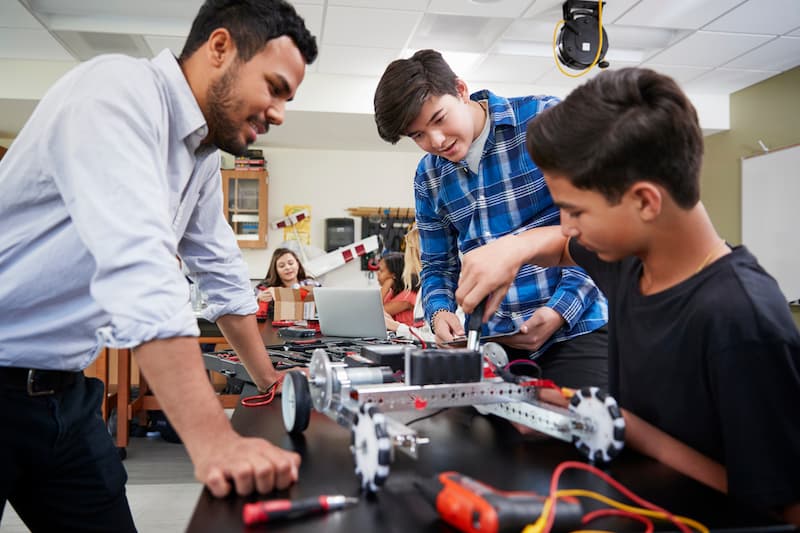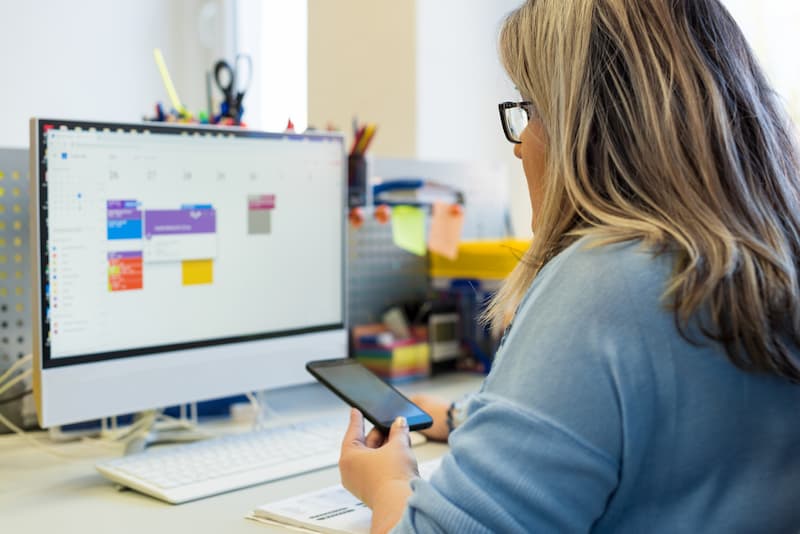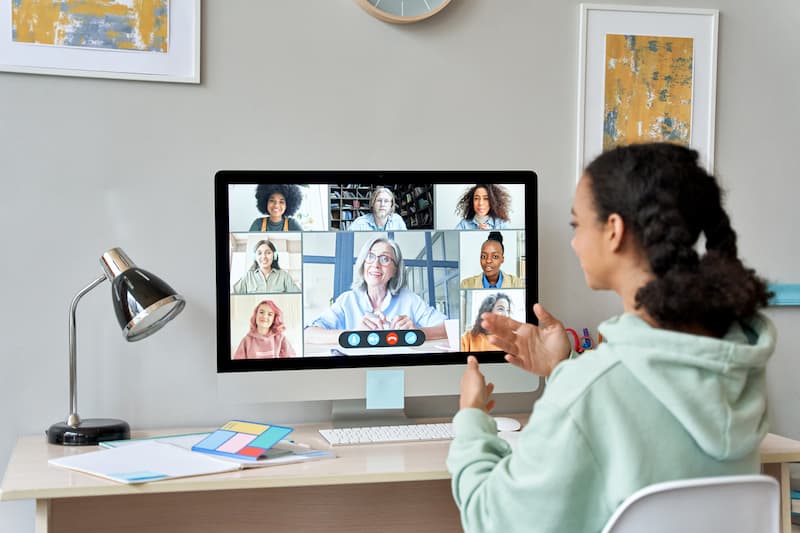
In today’s competitive academic landscape, providing your child with the right support and resources is crucial for their success. Today, we explore the advantages of online tutoring for Key Stage 3 students, offering valuable insights on how it can help them excel in English and Maths., We’ll also share practical tips for maximising your child’s learning potential, emphasising the importance of selecting a reliable tuition centre.
The Value of English and Maths at Key Stage 3
English and Maths are essential in the UK education system, as they form the foundation for all other subjects. According to the Department of Education’s report, students who excel in these subjects are more likely to attend university than those who don’t perform as well.
Transitioning from primary to secondary school can be quite a challenge for students. They must adjust to a new learning environment, diverse teaching methods, and a broader range of subjects. Fortunately, most students manage this transition smoothly, thanks to the expertise of their teachers who guide them through the process.

However, it’s crucial to remember that some students might struggle with these changes and require additional support.
As a parent or guardian, it’s essential to be aware of any difficulties your child may be experiencing during this critical stage. By identifying these challenges early on, you can help ensure they receive the necessary support, enabling them to stay on track with their peers and succeed in their academic journey.
Why Tutoring Is a Powerful Tool for Progress
Additional tutoring, particularly in Key Stage 3 English and Maths, can be a game-changer for students who find it challenging to adapt to secondary school or require extra support in their studies.
Online English and Maths lessons offer a personalised approach tailored to the individual needs of each student, which can significantly boost their confidence and understanding of the subject matter.
One of the critical benefits of additional tutoring is the focused, one-to-one attention that students often receive. This personalised attention allows tutors to identify and address specific areas where students may need extra help, ensuring they make steady progress in both English and Maths during Key Stage 3.
Online tuition provides a flexible learning environment, enabling students to learn at their own pace and in the comfort of their own homes.
Furthermore, additional tutoring can help students develop essential study skills, such as time management, organisation, and self-discipline, which are crucial for success in secondary school and beyond. By investing in additional tutoring and online English and Maths lessons for Key Stage 3, you are providing your child with the tools they need to excel academically and reach their full potential.
The Many Benefits of Online Lessons
At Achieving Success, we provide tailored online tutoring for Key Stage 3 students, focusing on English and Maths. Our highly qualified and experienced tutors offer personalised attention and support, boosting students’ confidence and academic performance. Our flexible scheduling fits around students’ extracurricular activities and family commitments, making learning enjoyable and stress-free.

Our online tutoring improves students’ English and Maths abilities and fosters essential study skills like time management, organisation, and critical thinking. These skills are invaluable for success in secondary school and beyond.
Our tutors are qualified and experienced teachers with expertise in both English and Maths. These are core subjects for expanding their skills across many other subject areas and provide the foundations for excelling wherever their academics take them.
Tips for Maximising Your Child’s Learning Potential
To help your child reach their full academic potential in English and Maths, here are some tips to consider:
- Choose the right support: Enrolling your child in a reputable English and Maths tuition centre can provide them with the guidance and resources needed to excel in their studies.
- Create a conducive learning environment: Ensure your child has a quiet, well-lit, and comfortable space for studying and attending online tutoring sessions.
- Encourage a consistent study routine: Help your child develop good study habits by setting aside regular time for homework and revision in both English and Maths.
- Promote active learning: Encourage your child to ask questions, participate in discussions, and apply their knowledge in real-life situations across both subjects.
- Monitor progress: Regularly review your child’s progress in English and Maths to identify areas for improvement and celebrate their achievements.

By following these tips and selecting a reliable Maths and English tuition centre, you can maximise your child’s learning potential and set them on the path to academic success.
Get the Right Support for Your Child Today
At Achieving Success, we are dedicated to helping your child reach their full academic potential in English and Maths. Our team of fully qualified teachers and tailored tutoring programs ensure your child receives the support and guidance they need to excel in their studies.
We invite you to contact us today to discuss your child’s requirements and arrange a free assessment. Let us partner with you in providing high-quality tutoring services to empower your child to achieve their academic goals and unlock their potential.

Failing an exam can be a disheartening experience, but it doesn’t have to be the end of the road. If your child just had a bad GCSE result, we can help.
At Achieving Success, we know that with the right approach, guidance, and extra GCSE tuition, anyone can bounce back from a setback and pass that all-important re-sit exam. We’ll walk you through a step-by-step guide to help you understand what comes next, share proven strategies for success, and reveal how our private tutoring services can turn a re-sit exam into a triumphant learning experience.
Provide an Emotional Support for Your Child First
Failing your GCSE exams can be a devastating experience. The shock of the result, and the realisation that you might not achieve your dreams right away, can be overwhelming. Fortunately, we live in a world where mental health has become more critical than ever. Luckily, there are things you can do to help your child during this difficult time.
- Talk about their feelings openly and honestly. They will appreciate it if you show that you understand how they feel, and it will help them move on from their failure.
- Encourage them to try again! Nothing stops them from retaking their exams if they are motivated enough. And if they are not ready yet, don’t force them – give them time to grieve before encouraging them to start again.
- Tell them that you believe in them. Even if they don’t achieve their dreams immediately, there is always a chance they can still reach them.
Offering your child, the proper support will encourage them to give their exam another try. It will help them regain the confidence they may be lacking and persuade them to submit for a re-sit of their exam as early as possible to help them continue the path they already had in mind after their GCSEs.
Talk to School About Options
If your child fails a GCSE exam or does not quite get the results, they need to continue their educational plan, the options available can vary depending on the school. Some schools may still offer your child a place in the sixth form if it is just one exam they failed. These are often referred to as ‘special arrangements’ and allow students to re-sit this exam later, usually in the summer term.

However, if your child has failed more than one exam, the school may require them to re-sit them with the year below or find alternative tuition and return when they have achieved the necessary grades. They can continue their studies at their current school onto A-Level with the next year of students. It is also important that you speak with your child about what they want to do next so they can make an informed decision about their future education and career path.
How Many Times Can You Re-Sit a GCSE?
There is no limit to the number of times students can retake their GCSEs, nor an age limit for attempting them. However, it is important to achieve a minimum grade of four in compulsory subjects like maths and English, as these core subjects are what most educational settings require to offer a place in their programme.
If your child must re-sit most of their GCSEs, we recommend focusing on core subjects first plus any other subjects necessary for your child’s chosen subjects at A-Level or to access courses at college. Trying to retake all of them in one year can cause a lot of stress on students and could cause potential burnout, which could jeopardise their re-sits.
Create a Plan Revision Together
It is essential to create a plan together with your child. This could include working out how many hours they will need to study each day, which subjects require the most revision, and what tools or methods of learning are best suited to them. It can also help if you sit down and discuss any issues or concerns that they may have about retaking their exams.
- Create a study schedule. It is important that you work out how many hours your child needs to revise each day, which subjects require the most attention and what tools or methods of learning are best suited to them.

- Provide the optimum study environment. The study environment should be comfortable and stress-free. Choosing a quiet, private place where your child can focus on their revision is best. You should also ensure no distractions, such as TV or interruptions.
- Provide the right tools for revision. The tools you provide will depend on what subjects your child is revising for and how well they are doing with each one. For example, if they are struggling with maths, a calculator may be useful, but if they know how to do basic sums, it would be better to give them flashcards instead (which can be used in other subjects).
Planning revision techniques together can help your child stay on track and ensure they do not miss anything important. You can also help your child develop their revision techniques by asking what works for them and why.
Get the Right Tutor
When re-sitting a GCSE, getting additional help for your child is essential. It could be that their current teachers’ teaching style does not work efficiently for their needs and by seeking out a tutor to match your child’s needs, you will provide them the best chance to pass their GCSE re-sits.
At Achieving Success, we have a network of tutors in Birmingham that can help with all subjects. Whether it is English, Maths or Science, we can provide you with the best possible tutor for your child. We can also provide you with a range of services, including exam revision materials, extra help sessions and online tutoring. Our tutors have vast experience in the education world and will ensure that your child is given all the support they need to pass their GCSE re-sits. For information on our GCSE Holiday Workshops or any of our services to support your child, enquire online, and our team will be happy to help with any questions you may have.

Summer is a time for relaxation and fun, but it can also be a valuable opportunity for children to learn and prepare for the upcoming academic year. With the right approach, you can help children make the most of the summer months by providing enriching and educational experiences supporting their academic success.
Whether through private tutoring, summer workshops, or outdoor learning experiences, there are many ways to help children stay engaged and motivated during the summer break. As leading private tutors in Birmingham, we’ll explore some of the best ways to make the most of summer with great learning opportunities that will prepare your child for the upcoming academic year.
Delve Into History With Local Museums
Museums help develop curiosity, creativity, and critical thinking skills, so taking kids to museums is a great experience. They get to learn about history, art, science, and culture in a fun and interactive way. Plus, it’s a great family activity that creates lasting memories and brings families closer together. Here are some local museums offering insightful experiences of Birmingham’s history. Even if you are not local and take advantage of our online tuition services, they are worth the day trip.

Birmingham Museum and Art Gallery – This is the largest museum in Birmingham, and it houses a vast collection of art and artefacts from around the world.
Thinktank Science Museum – This interactive museum is located in the city centre and is dedicated to science and technology.
The Barber Institute of Fine Arts – This art museum is located on the University of Birmingham campus and has a collection of paintings, sculptures, and other art objects.
The Black Country Living Museum – This open-air museum is located about 8 miles from Birmingham and showcases life in the West Midlands during the 19th and early 20th centuries.
The Coventry Transport Museum – This museum is located about 20 miles from Birmingham and has a large collection of cars, motorcycles, and other vehicles.
Get at One with Nature
Keeping the children entertained for six weeks can be challenging for most families, especially with costs rising for entertainment passes and leisure complexes. However, nature has unlimited opportunities to keep busy and develop children’s education. For example, encourage your children to spend time in nature by taking them on hikes, camping trips, and nature walks or enrolling them in nature-based programs or summer camps. Outdoor learning provides children with hands-on experiences to help them develop a deeper understanding of the natural world.

Additionally, nature-based activities can enhance children’s problem-solving, critical thinking, and creativity skills. For instance, it offers basic skills such as map reading and foraging. Likewise, being in nature provides a sense of curiosity and wonder, encouraging children to ask questions and explore their surroundings. It is a great way to get them away from screens whilst improving children’s physical and mental health, promoting overall well-being, which can also help them get ready for a fresh start to the new school year.
Teach Basic Life Skills
There are many things children can learn from home which don’t require books and studying. Many of these things come naturally as adults, but passing these skills on early to your children can help them when they come to run their own households. They can also help build on the knowledge they are already learning through education. For example, whilst shopping, instead of leaving the children at home, consider taking them with you and teaching them how you make conscientious decisions for your purchases.

Teach them how to ensure you are getting the best deal by checking the cost per unit and not the overall price, and this can build on their mental maths knowledge, which can be applied once they are back in the classroom. Alternatively, you could teach them about ethical purchasing, which will help them better understand the world economy and why some products are more ethical than others. You could even explore the environmental impact of purchasing products locally and how this will benefit their future.
Simple skills and lessons like these can help inspire a child’s curiosity and turn dull experiences, like shopping, into insightful experiences which can be fun – making chores and daunting activities into something everyone can enjoy.
Find Some Volunteering Opportunities
Volunteering can have numerous benefits for a child’s education. Offering their time to those who need it can help children develop empathy and a sense of social responsibility by exposing them to different social issues and community needs. It can also promote the development of important life skills, such as communication, teamwork, problem-solving, and leadership. These skills will help not only in their educational experience but in the future of their careers.

Additionally, volunteering can provide children with valuable opportunities to gain hands-on experience in their areas of interest, helping them to explore potential career paths and develop a sense of purpose. Taking time to help others can also help children build social connections and expand their networks, which can be beneficial for future academic and professional opportunities.
Give Them A Head Start On Their Academic Year
Signing children up for private tutoring during the summer holidays can be a great way to prepare them for the upcoming academic year. Private tutoring can provide individualised attention and tailored support to help children develop the skills and knowledge they need to succeed in their studies.
Tutors can help children review and reinforce key concepts from the previous academic year, filling in any gaps in their understanding. They can also provide advanced instruction and practice in areas children may struggle with, giving them a head start on upcoming coursework. In addition, private tutoring can help build children’s confidence and motivation, which can be especially important for children who may be anxious or struggling academically.

Get Help with Achieving Success
If you’re looking for private tutoring or GCSE holiday workshops, consider our great selection of programs. We offer online tutoring while providing lessons from our tuition centre in Birmingham to help students prepare for upcoming coursework and exams. With personalised attention and expert guidance, we can help your child achieve their academic goals and build the confidence and skills they need to succeed. Get in touch today for an initial assessment of your child’s needs.

Finding the right secondary school for your child is essential. Whilst children will grow to learn and interact with others, secondary school is where children will become dependent, and their environment will become the foundation of forming relationships for later in life. Their education is also vital through secondary school as this could influence the career path they choose and who they decide to be as adults.
As a leading provider of online tuition in Birmingham, we have seen many parents struggling with how to apply for a secondary school for their child. So, to help, we have put together a few things to consider. We have also included the dates to remember and where to go to apply for a secondary school place.
When Should You Start Looking at Secondary Schools?
There is no correct time to begin looking for your child’s prospective secondary school, but most parents will usually start assessing their options whilst their child is in year 5. You may even wish to start earlier if you live in an area with limited choices or a high demand for places. Although you may have heard great reviews about a school, visiting them in person allows you to get a better feel of what the school can offer your child and enables your child also to get a feel for the place where they will be spending the rest of their mandatory years in education.

Although leaving your visits until the final year of primary school is perfectly acceptable, making several visits over several years can help showcase how the school is progressing. A good school will consistently be making improvements with each year, so seeing how the school changes between your visits can be an excellent way to see how they are addressing the needs of the students.
One-to-One Visits Vs Open Evenings
When visiting your prospective schools, it is always a good idea to see them on a one-to-one appointment and during their open evenings. During the open evening, the school will showcase the best that their facilities offer, with exciting experiments, keen students willing to stay behind to show parents around and usually, there will be a deep cleaning of the school. Whilst you will be looking to see the school at its best, it is not the best way to get an accurate view of the school’s daily operation. However, the open evenings are still great for getting a feel of the school. They allow you to see how teachers interact with children, especially in busy environments and offer the chance to ask students questions about their own experiences in their time through the school.
In comparison, a one-to-one visit will allow you a more in-depth view of the school, and any good secondary school will offer a guided tour of their establishment any time throughout the year. A designated teacher, often a Head of Year, assistant head teacher or even the head teacher, will walk you around each department, introducing you to some teachers and exploring what the school facilities offer in much more depth than can be done on a busy open evening. It also allows you to see how a school operates on a day-to-day basis, giving a much more natural light on the school’s running. So, if you are undecided about your child’s school choices, book one-to-one guided tours throughout the day. It will help you to understand which will be a better fit for your child.

What to Look For in a Secondary School?
There are many things to consider when visiting the school. Many of which will be personal to the needs of your child. For example, for students who may be neurodivergent, a good SENCO facility will be an element you may be looking for. Alternatively, for students showing eagerness and excelling in a particular subject, you may be looking for excellent facilities to help them grow in that area, such as sports, maths or languages. However, even as an 11-year-old, their love for subjects will most likely change with each new school year. So, whilst choosing a school for its sports facilities may be a good idea, ensure they have an equally rounded curriculum to offer your child.
Other than the personal reasons for choosing a secondary school, there are many other things to consider.
How Clean Is the School?
Cleanliness should be something to look at during your visits. Look past the teaching areas, which may be carefully presented and visit the communal areas. Toilets, libraries, canteens and halls are an excellent way to see how well-maintained the school is kept.
How Big Is the School?
The size of the school may also be something you consider. Smaller schools may offer more one-to-one learning opportunities, whereas a larger school can create a community feeling within their students.
What Extra-Curriculum Opportunities Are There?
A school offering more extracurricular activities will allow your child to grow their knowledge and skills further than the classroom, which may help them later in life. The more opportunities you can offer your child, the broader their experiences will be.
What Does the Curriculum Offer?
Although each school will cover the national requirements, what else does the curriculum offer your child? Many schools are expanding on life skills with budgeting lessons, relationships, mental health awareness, and other elements that may help them as adults.
Should You Involve Your Child in the Decision?
Absolutely. Involving your child in the choice will help them to settle in better when they start their first year of secondary school. If you choose a school which they have strong opinions against, this may affect their learning and hinder their experience and performance within their school education. Getting them involved from the start allows them to feel part of the process and take an element of responsibility for their own education.

They should be with you when you visit the schools. However, if you are booking a one-to-one visit, you may wish to do this without them if you have some personal questions you may not like them to hear (for example, if you have a child who requires SENCO facilities). Still, speaking with them about the choices and deciding on them together can help offer them a great start to their secondary education. Of course, whilst the decision remains firmly with you as their guardian, opening that dialogue provides a more balanced decision for your child’s best interest.
Applying For a Secondary school
The deadline for applying for a secondary school is the 31st October each year for students in year 6. This is why we recommend making your decisions earlier than their final year. Most local authorities will allow you to submit your applications as early as September, but even if you offer your choices early, it does not mean you are guaranteed your place. You apply for Secondary school places through your local authority. They are not served on a first-come, first-served basis, so there is no need to worry about getting in your application until the deadline. Most applications can be made online, but speak to your child’s current primary school if this is not an option for you.
Each school has criteria for admissions, which can usually be found through your local council’s website under their application for a secondary school page. Often they may require an 11 Plus exam, a separate test from their SATs. This test usually gives children the advantage of getting into more academically driven schools, usually grammar schools, and we can help with preparation with our successful 11 Plus Grammar tuition.
The application will ask for three choices of schools, your first choice, second choice and third choice. We suggest ensuring you fill in each box as this will help guarantee your child a school that you have chosen. If there is no room within the first two schools and you have left the third one blank, the local authority will assign a school you may disagree with. However, most schools will try to accommodate as many first-choice pupils as possible, but this is not guaranteed.
Appeals and Waiting Lists
Acceptance letters are issued on 1st March following your application. If this falls on a weekend, it will be issued the next working day. If you have chosen to do this online, you may be able to access the information reasonably quickly.
However, if you are unhappy with the outcome of your admission to your chosen school, there are two options you can take.

Appealing the Decision
Whilst most local authorities will aim to fulfil the wishes of the options, it is not always possible, and this could lead to getting a place within a school which may not be practical. You have the right to appeal to an Independent Admission Appeal Panel, whose members played no part in the original allocation of places. Appeal details will be provided in the letter which offers your child a place.
Waiting Lists
If the place you receive is not one you were hoping for, there is often the chance to request that you are placed on a waiting list for when a place becomes available. Even if you put the school as your first choice, this doesn’t automatically put your child on the waiting list. Contact the educational sector of your local authority for more information about putting your child on a waiting list.
Any appeals should be submitted by 10th March for a quick response. After this deadline, your case will be chosen when there is time and could delay the actions needed. So, if you are looking to appeal the decision, submit it before this date.
Getting Help For the Final Year at School
The last year of primary school can often be challenging for some children, from the pressures of Year 6 SATs preparation or even the skills practice for their 11 Plus. As a leading tuition provider in Birmingham, we can help ease the stresses with online tuition and workshops. Take a look at all we can offer online, and give us a call to speak with us about the exact needs your child may have. We have excellent success rates with all our students and will provide everything they need for the start they need for secondary school.

GCSEs are a vital milestone for any child and will provide the foundation for their success in later life, whether for obtaining the grades they need for higher education or giving them the best chances for employment. As a parent, we know that you will want your child to achieve the best they can to provide them with the best start in life, but you may not know where to start supporting your child through this stressful education period. As a leading provider of online tuition in the UK, we are here to help. Today we will explore how best to help your child with their GCVSE revision and the benefits you can have as a parent, regardless of your educational background.
Create a Schedule Together
Whether it’s keeping on top of regular chores or ensuring everyone is where they should be daily, planning and structure are essential for an organised household. As a parent, organising and creating a weekly schedule may come naturally. However, these skills may not come as naturally to your child, so sitting with them to devise a plan for when they can dedicate the time to study for their exams could be extremely helpful in assisting your child in feeling more prepared for their GCSE exams.

Although it may feel like a good idea to plan to study for every free time they may have within their weekly activities, you must also remember to ensure they have a good balance of learning. Studies have shown that taking a break every 45-60 minutes of the revision can improve the success of retaining the information and improve concentration levels. In addition, it can minimise burnout and stress levels. Helping your child develop a productive yet efficient schedule will ensure they are ready for any assignment and exam they need to complete.
Set Up a Study Space
A dedicated area your child can use to study will help them concentrate on their studies and block out distractions. Dedicated study space can reduce stress levels, increase focus time and offer consistency for implementing dedicated study times. Whilst they may prefer to hit the books in the comfort of their own room, this could risk various distractions and even prevent them from getting a good night’s sleep. Separating their relaxing space from their study space can help compartmentalise downtime from focus time, which allows them to switch their focus more successfully.

Your child’s study place should be free from clutter and offer access to resources they may need, such as internet access, stationery and enough workspace to spread out all their essentials. Additionally, a comfy seat is essential for ensuring they are comfortable whilst studying and can help prevent aches and pains, which can prevent them from wanting to study in the first place. Offering them these basic study requirements will provide them with all they need to concentrate and hit the books without distraction and struggling to have the necessary resources.
Revise with Them
Whilst you may feel out of your depth helping your child revise, it could be a great way to increase your child’s confidence and feel supported in their studies. Even if you are unfamiliar with the materials they may be studying, offering to help them could give them a chance to ensure they fully understand their subject, as they will be teaching someone without insight on the topic. This process could be a significant confidence boost for your child and help them see the success they have already achieved with their revision, encouraging them to continue the hard work they have already put in.
In addition, by offering assistance in revision, you could give them a new perspective on any areas they struggle with. Most parents will have already been through their own GCSEs, and whilst the subjects may have changed for various exams, the techniques and revision methods you may have learned for your own exams could still be applied. Even experience and skills you have learnt after your school education may offer assistance in better techniques. For example, suppose your child is struggling with a maths problem and the standard methods their class has been taught; you may have an alternative way to achieve the same results, which may suit your child. So, regardless of your experience or education level, even just being a soundboard for your child to bounce ideas off could be significant to the success of their revision. For the more technical elements of helping your child overcome hurdles in their studies, you could always reach out to our GCSE tutors in Birmingham, who will be happy to help understand whichever subject they may be struggling with.
Encourage Healthy Habits
It is a well-known fact that a healthy lifestyle boosts endorphins to promote productivity and a positive attitude towards personal growth. There are many ways you can help your child to maintain a healthy lifestyle whilst they are going through the most stressful period of their life. Encouraging your child to make healthy choices whilst dealing with stressful situations and being under pressure is an essential skill that can help them throughout their entire life, so learning this young is a great way to provide the foundations for a lifetime of success. See below for examples of healthy habits that could benefit your teenager throughout their exams.

Technology Downtime
In a world of addictive social media, online gaming and being accessible at any hour of the day through messaging can add to the pressure and stress your child may already be suffering. Recommend regular intervals where your child will cut off from technology altogether and give them the space to relax and switch off from the internet. Of course, we understand that every lifestyle is different, so we advise speaking with your child to see when this will work for them and explain how it isn’t a punishment but a way to help them reduce unnecessary stress.
Regular Exercise
Exercise doesn’t have to be a strenuous activity. It can be as simple as a daily walk with the family dog or through a local park. Whatever they may enjoy, help them schedule a time to get moving. This will help reduce stress levels and may even give them breathing space to overcome issues they may have with their revision. However, if your child is athletically minded, see if there is a sports team they may enjoy joining. Again, this will help with creating a consistent routine and schedule.
A Healthy Diet
Eating poorly can reduce productivity levels. Consuming foods high in sugar and processed fats can cause lethargy, preventing them from concentrating during their study times. When shopping for your family, be sure to pick up a range of healthy snacks and meals offering vitamins and proteins to elevate their ability to focus. Whilst we aren’t saying to ditch the Friday night takeaways, having a good balance throughout the week can promote a better balance than snacking on sweets and processed foods. Keeping hydrated is also essential to maintaining focus and preventing fatigue.
A Good Night’s Sleep
A good night’s sleep is essential for the ability to concentrate. Being well-rested will give your child the stamina they will need to get through a day of school and activities and still find the time to fit in their studying. A typical 15-year-old needs 8-10 hours of sleep to support their physical health, mental health, development, and growth. Teenagers need to get into healthy sleeping habits, such as a consistent sleep schedule, avoiding stimulating devices before bed, and a comfortable sleep environment.
Get Professional Help For Your Child
If you feel that despite your best efforts in assisting your teenager with their revision, they are still struggling with revising for their GCSEs, it may be an opportunity to get outside help. Most schools will offer workshops and out-of-school sessions to help students with their studies. These are great if you may be struggling to find a dedicated distraction-free space in your home or if there is a specific issue your child may be having. However, these sessions often rely on volunteer teachers to remain behind and may not suit your child’s needs.

At Achieving Success, we offer bespoke programmes to suit your child’s exact needs. Whether they require one-to-one assistance or prefer working with others in the likes of our GCSE Holiday Workshops, we can help. Working with you and your child, we will ensure they have all the help they need to get the best they can in their GCSEs. So, enquire online today to help your child achieve success in their GCSEs.

GCSEs are essential from the minute you begin secondary school. They are the end goal for thousands of students each year and act as the foundation for your higher education and future career. Although you may not think they have much relevance with all the available qualifications employers can look to seek, they are still very valuable.
Whilst GCSEs used to begin in year 10 for most schools, there are some educational settings allowing students to begin them early. Some schools offer GCSEs from Year nine. This lower age is claimed to help reduce the stress of many exams and coursework in a short two-year period. However, it is more common for GCSEs to begin in Year 10. Before they begin, there is much to consider, including the GCSE options and the skills needed to ensure the best outcome. Unlike primary school, secondary school is more about learning and developing skills in addition to knowing the relevant information. So although you may not begin your GCSEs until Year 10, the skills you will be learning throughout the first three years are in practice with achieving success in your final GCSE exams. We offer a range of services to help you get prepared for GCSEs, so if you are worrying, why not take a look at our online tuition?
Do You Need GCSEs for A-Levels?
In short, yes. 5 GCSEs must be obtained to progress onto A-levels, each with a grade of 4 and above. A-levels can be very daunting and rely on students taking much more responsibility for their own learning, so perfecting the correct learning strategies and skills at GCSE is vital to A-Levels’ success.
GCSEs are the foundation for students to grow their skills and knowledge for A-Levels. For example, our GCSE English tuition in Birmingham offers the ability to learn the skills needed to understand the context behind written texts, which is helpful when it comes to studying this within A levels.

Within A-Levels, students must complete the work set without excessive encouragement or the same assistance that GCSE years offer. This can be difficult for students who didn’t take responsibility throughout GCSEs with their revisions and avoided the temptation to cram and revise the night before the exam. So, whilst the grades of GCSE are essential to access this path of higher learning, self-discipline is also an important skill needed.
Do You Need GCSEs for NVQs?
NVQs are a higher level of education, usually provided by colleges that offer an alternative to A-levels for more practical careers such as trades, hairdressers and beauticians. However, an NVQ provides an excellent introduction to many desired careers. It has various levels to complete, and each level can be accessed with varying GCSEs. Essentially, the better GCSEs you have, the higher level you can begin your NVQ training at.
- Entry Level NVQ – This requires no previous qualifications and teaches the fundamentals and essential knowledge and skills.
- NVQ Level 1 – This level is an introduction to the subject, so it may require very little if any, qualifications from GCSE.
- NVQ Level 2 – Unlike previous NVQs, these may expect a certain amount of previous education before being able to join the course. Most Level 2 NVQs require at least 4 GCSEs at A*-E / 9-3 grade, including the essential maths and English.
- NVQ Level 3 – If you have already completed the Level 2 NVQ in that topic, then you are instantly accepted for a level 3. However, if you have achieved higher GCSE results, depending on the subject, you may be able to skip the Level 2 NVQ requirements and get a head start on your NVQ.
- NVQ Level 4 + – NVQs can go up to level 7, equivalent to a master’s degree from the university. Only a few colleges offer this, and you may find the need to finish the course at your local university.
Do Employers Require GCSEs?
Although you may intend to leave education after GCSEs, the law instructs that anyone under the age of 18 must remain in full or part-time education. However, this does allow you to explore the part-time job market or even take up an apprenticeship. If you are applying for an apprenticeship, your grades will be heavily considered if there are no other forms of education level. This route means that the first person judging your GCSE results will likely be an employer.

Apprenticeship schemes are a significant investment for a company, and to offer them, they need confidence in the apprentice they are looking to hire. Strong GCSE results reflect the commitment an individual has been willing to make for their own personal gain and achievement. This proves well for a company that is looking for the same commitment from an employee whilst they pay for their training.
When leaving education at 16, you have no real-life experience within a working role. The only appeal that helps you stand out on a CV is the ability to provide excellent GCSE results. GCSEs are even more critical if you leave formal education entirely and partake in an evening class to ensure you remain lawfully in education. This gives employers the confidence that you have chosen a route out of education from a place of strength instead of a disinterest in bettering yourself.
Which GCSEs Are the Best to Take?
If you have a clear path you wish to take, which most students do not when choosing their optional subjects, then picking a topic around that career could be a good option. For example, if you aimed to become the next Gordon Ramsey, food technology would be an ideal GCSE to take. However, very few students are ready to make that commitment at such an early age and will lean towards subjects they think sound fun and exciting such as P.E., Art and Psychology.
Unfortunately, students are unaware of the actual work that is involved with these subjects and many times, students end up switching to a subject that is much less theory-based, such as maths and I.T. Each student is different, so whilst one choice will work out for one student, it may not work for another. However, instead of thinking about a specific career, a good plan is to choose topics that can be applied to multiple.

A language will always offer significant benefits across your career. It will allow you to travel and expand your business internationally, which will be highly regarded from an employer’s point of view. I.T. is another excellent subject. As the world becomes more digital, having the basic principles of the programs used within workplaces is a great foundation to have. Of course, English, Maths and science offer the best comprehensive knowledge and skill set that will do a student well in their career. These topics are so important they are usually compulsory in secondary school, many of which offer them as a more in-depth course, with the option to take the subject further. However, if you find yourself struggling with these compulsory topics, such as maths, we offer the best GCSE math Tuition in Birmingham. Feel free to get in touch.
Getting GCSE Help
It is never too early to consider preparation for GCSEs. In fact, with many students beginning in year nine, we have seen an influx of students seeking help from our GCSE tuition in Birmingham. Our tuition allows students to keep up or even get ahead of the game with their GCSEs and offers the most benefit when they begin earlier. For more information on our services, call us on 0121 769 2795 or email us at info@achieving-success.co.uk.

The 11-plus examination has been around since 1944. It is an entrance exam used by some schools, usually Grammer schools, to assess if a child’s understanding and learning ability are of a high standard. The test is taken, often on the weekend, by year six students wishing to attend a school with these necessary exams as a requirement.
The actual exam will vary from school to school but will cover several topics that the school deem desirable.
Verbal reasoning. This element of the test will require a child to have a vast vocabulary and a good understanding of the English language.
Non-verbal reasoning. Non-verbal reasoning will encourage the child to think about images and diagrams. It will urge children to solve problems when faced with images and visual information but will focus less on the written language.
Maths and English. Interestingly this element is less common in the 11-plus exam compared to the verbal and non-verbal reasoning parts. However, they are of a very high standard if included, so we are proud of our 11 Plus Grammar tuition results, in which we have achieved 100% pass rates. Working with your child, we can help to ensure their work and preparation offer the best outcome.
The Format of the 11-Plus Exam
Again, this will vary depending on the school, but there are two ways the test is offered to students. The first option is multiple choice, where students are given a select number of answers and asked to pick one. Alternatively, schools may offer the traditional option where children are expected to fill in their own responses.
When Should Preparations Take Place?
Although the exam does not take place until their final year of primary school, preparation for the test should ideally start much earlier. The 11-plus exam aims to identify the most academically able children for the limited spots available at the school, so preparation should begin as soon as possible. The sooner you prepare your child, the more natural the exam will feel to them without inducing worry. We will guide you on what you should be expecting from your child each year to ensure the best outcome for the 11-plus exam.

Preparation for Year 3
Year three is where preparation for the 11-plus exam really begins. Although the learning is not focused on any exam, how they manage and develop in year three will significantly offer them an advantage in the test. At 7 or 8, they should already have the basic ability to construct simple sentences and average knowledge of their multiple times tables. This year children are encouraged to learn without fear. Year 3 is the first-year children may begin to feel more challenged in their tasks, so tackling these without fear is essential and will offer them the core qualities needed for the exam.
Preparation for Year 4
Children can start to be introduced to the exam content at this age. Although this should be done progressively, introducing them early to what is expected will have them much more prepared for when the exam is placed in front of them. Although they should be encouraged, they may not achieve the desired results. This also could be a fantastic opportunity to get them to understand the importance of perseverance, which is an excellent lesson for most children. They will also be taught exam etiquette and what to expect when working under exam conditions.
Year 5 – The Most Critical Year for Preparation
Year 5 is the year most children are encouraged to study for their 11-plus exams. Getting help early on to prepare them will provide better outcomes for the 11-plus examination. Although there is nothing wrong with this, earlier intervention, as mentioned, can offer a more natural understanding and approach than trying to cram everything in during a year, especially if you believe your child may need assistance.
Within year 5, children will have a thorough understanding of the content that will be expected from them during the test and can grasp the expectations when sitting an exam. By this age, they will have advanced their maths and English skills to exceed the national average and continue improving this with advanced studying.
Is It Ever Too Late to Prepare for the 11-Plus Exam?
In short, essentially, no. Many gifted children working to an elevated level throughout their school years may already have the fundamentals required for the test. If this is the case, then starting their preparations in year six may not be an issue, but no preparation at all can set your child up to fail. In addition, for most children, leaving the practice to the last minute will increase their pressure to succeed, and you may see them struggling to study effectively.

For this reason, we always recommend getting a head start when choosing a secondary school for your child. This way, you can understand the requirements for each school and whether your child is expected to pass the 11-plus exam, offering your child the best chance of succeeding with the help of Year 3 to 5 tutoring assistance.
Our online tuition offers incredible results and is the best option for achieving success. The examination is free to all students and is usually taken on a weekend, so they don’t interrupt students’ day-to-day education. However, the only way you can guarantee the results your child needs is with early preparation from experts who know what they are doing. If you are interested in our services, feel free to call us on 0121 769 2795.

Prior to the pandemic, online learning was an option rarely considered by most people. However, with everyone being forced to continue their studies virtually during the lockdown, it quickly became evident that there are plenty of benefits to studying from the comfort of your home.
Now, with ‘Working from Home’ becoming normalised throughout businesses, with options such as Microsoft Teams and Zoom available, your child has plenty of opportunities to learn online.
Offering your child the chance to keep up with their studies whilst embracing the world of video calling could help them in many ways once they leave school.
As a leading provider of private tuition in Birmingham, we thoroughly enjoy reaching more students than ever through online learning.
What Is Online Tuition?
Online tuition is a very broad term and covers a scope of formats for delivering extra tutoring for students. This format can range from receiving workbooks and texts online to work through at their own pace or face-to-face video sessions, including one-to-one teaching or a virtual classroom style.
Essentially, online tuition is the same teaching you would typically receive face to face but delivered through a virtual presence.
The Benefits of Online Tuition
Although in-person teaching offers many advantages, online tuition has several benefits that in-person learning can’t provide.
More Opportunities
One of the most significant drawbacks to in-person tutoring is often the lack of availability of tutors within a specific area.
Although there are hundreds of tutoring services throughout the country, not every child has the same accessibility, and waiting lists can often be months or years long. This can result in looking further afield, meaning long commutes and expensive travel costs.
Online tutoring is accessible to every student with home broadband in many countries. This offers many more equal opportunities and gives more students a chance they may not have had in the past.

Ideal for Shy Students
Whether nervous in a large group or struggling to meet new people, learning online can introduce students to their peers or tutors whilst comfortable in their own homes.
As a company with expertise in online tuition, we often see children struggling in a face-to-face environment flourish and gain so much confidence that they can come to our in-person sessions they previously didn’t find appealing.
No More Rushing Around
Instead of being another function you’ll have to take them to, your child can buckle down with their 11 plus tuition whilst you are free to supervise or continue with other tasks around the home. This flexibility frees up any commute time, waiting around, and even the cost of getting them to and from class. It’s much less restrictive as it frees you up to spend the time how you need.
Who Teaches Your Child?
You may worry about the tutor’s credentials when finding online tutoring. A reputable online tutoring service will ensure your child is matched with a tutor with all the relevant expertise and qualifications. However, this can range from undergraduate students to retired teachers. So, finding one with the appropriate knowledge to deliver the education your child needs may be challenging.
As a leader in online tuition in the UK, all our tutors are fully qualified teachers currently enrolled in teaching. Each person is an expert in their field and knows everything required by the relevant examination boards. Exam boards can change year by year, so we ensure that our teachers know precisely what your child needs to pass their exams successfully. We only hire current teachers to ensure that your child receives up-to-date material and learns in line with the established curriculum of the time.
Solo vs Virtual Classroom
Solo lessons offer students a one-to-one tutoring session. It is usually done over video call and works directly on your child’s needs. This allows the tutor to engage with the student fully, get to know them personally and fit any teaching around how they will absorb it best. This can be ideal for students struggling in a classroom environment and are prone to distraction.

A virtual classroom offers the chance to learn with peers their age via a video call. Since the pandemic, many children will already be used to receiving learning in a virtual manner, and this can help get them used to communicating with others virtually. This skill, we predict, will be much needed throughout many professions in years to come. It also helps them learn with peers of a similar educational level and encourages cooperative learning with collaboration and interaction.
How to Know What Your Child Needs Educationally?
If you are looking for high-quality online tutoring, you may already believe your child may need extra help to reach their full potential. How to deliver this can only be assessed by a qualified tutor. As a parent, you’re not expected to know the ins and outs of the national curriculum and what your child may need help with. This is why at Achieving Success, we offer a free initial assessment of your child’s current understanding to offer you the best bespoke services for your child to reach their full potential.
Once your child receives their classes online, we will ensure that you are not in the dark about their progress and will offer updates on their development and achievements. Our courses can cover most school ages, from Primary Level Boosting to GCSE tuition, so whatever exams, age or struggles your child may be having, we can help.
All our programmes can be found online, but to get help for your child or more information, you can call us on 0121 769 2795.

Children often come in two categories when it comes to studying, those who love to and those who don’t. Having a son or daughter who has little or no interest in completing schoolwork in their spare time can be challenging. The last thing anyone wants is to disrupt a harmonious home with arguments, and a child being forced to do their work will usually not reflect their best.
So how do you encourage children to do their homework and study when they have 1001 excuses why they can’t? We explore how to avoid disagreements and have assignments and studying done on time, whether it’s for an 11-plus exam or GCSE preparation.
Do It Together
The best way to encourage a child to sit and study is by reducing the isolation it can often entail. Offering to help them through it will strengthen your parental bonds and showcase your desire for them to do well, which may encourage your child to want to succeed on their own. Also, it offers the chance for you to see if they are struggling.
Often children may not wish to admit when they find something challenging. Like any adult, they suffer from keeping their pride. Sitting with them will support you in seeing if there are any subjects they require help with, with the likes of online tuition.
Create a Fun Study Space
If a child has no space to study, or the only space available is at the dining room table, they are less inclined to concentrate on studying. You can help by creating a colourful and customised space in an appropriate area of your home for them to hit the books.

Dedicated study spaces at home have been proven to help children achieve their best. Whether you find room in their bedroom or dedicate an area of the communal rooms, it needs to be a space they can shut off the outside world, reduce distractions and apply themselves to their work. You can still make it fun and inviting by decorating it to their style or in colours they enjoy.
Discuss Their Future
Whether you have a child studying to take their 11-plus or a student in their final GCSE year, it is never too early to discuss their plans after education. Engaging your child in their own plans for the future will help them understand the importance of achieving well in their education to get the easiest path to their desired career.
Whether it is a national footballer, a police officer or a career in the manufacturing or scientific industry, all professions are easier to get into with higher education. Many fields even require a university degree. Explain to your child the importance of studying to achieve their goals, and you may find they become a little more enthusiastic about concentrating on their studying.
Communicate Issues with Their Educational Setting
Children often detach their home life from their school life, which is more prevalent throughout primary school education. Detachment from education at home can result in a lack of interest in the subject matters they learn in class. Try as you might, often trying to convey the importance of studying to your child can be difficult.

If you are having severe issues getting your child to study for their upcoming exams or simply staying on top of their homework, discuss these worries with their teachers. Whilst you may not see any problems at home, the school may have picked up on some concerns. Teachers are experienced in engaging children, so they will be a good point of support for getting your child back to studying at home.
Create a Schedule Together
Each family and each student is different. Finding dedicated time to study can often be a challenge if there are a variety of out-of-school commitments which get in the way. Sitting down with your child and figuring out where there is available space in their schedule can help them get into a routine of studying and will soon become a habit.
In addition, don’t forget to schedule some free time. Studying overload can be a common reason for children to resent the need for revision. They learn all day at school, so coming home to hours of additional studying can be off-putting. Make sure to use the schedule to plan fun activities and downtime to help them achieve an optimal mental space to take in what they are studying well.
Help Them With Study Techniques
As mentioned above, all children are different. What studying techniques work for one student may not work for another. There are many ways children learn, kinetically, visually and audibly. If your child struggles to concentrate and absorb the information, they may be reluctant to study.

Speak to your child about how they think they can learn best and if there is a particular method, help them set this up for all the subjects they need to study. As experts in GCSE tuition, we have seen many children reach the age of 14 and have struggled throughout their entire educational years because they have been kinetic learners and therefore have required tailored materials to their needs. Finding a way that works for your child will help encourage them to study.
Get Outside Help
If you have tried all these techniques and nothing seems to be working, it may be time to consider getting expert help. Private tutors have years of experience with students of all capabilities and can work one-to-one with them to ensure they take in the lessons they are learning at school.
At Achieving Success, we have a team of tutors, all qualified in teaching and offer a range of programs to fit in with family life. We have the best results for GCSE and students excelling with our 11-plus tuition in Birmingham.

We can offer assistance to help your child achieve the best they can get. It is never too early to start, so speak to our team today by calling 0121 769 2795.

Entering GCSE year with your child can feel all-encompassing, and without a pre-organised path, it may prevent any serious commitment from your child. It is never too early to plan for what’s next after GCSEs.
So, as your child enters the start of the most significant exam years of their education, we cover the pros and cons of each setting and the advantages it provides to each student. Having a goal in mind before the exam period can help your child concentrate on vital GCSE preparation.
The Advantages of Sixth Form
Sixth form is often the most natural choice for the academically minded students wishing to follow through to university. Usually, based on the same grounds as their current secondary school, it offers familiarity and comfort, with the advantage of already knowing the school and many teachers. In addition, since they completed their GCSEs within the school, it may help the teachers address their needs from the beginning, instead of getting to know the student from the start. This bonus will help the teachers understand the student and how they learn best.
Alternatively, attending a different school for sixth form could be a possibility. Many students often change schools for their A-levels as this gives them a fresh start and the chance to buckle down without the distractions of socialising with lifelong friends. It also provides the opportunity to assess the status of local schools and choose one which may achieve better results from students, giving an advantage to doing well in their final exams.

One of the advantages of attending sixth form is the natural progression it offers to university and being surrounded by like-minded acquaintances. The student pool is often much more intimate, resulting in more one-to-one time with teachers. Being around others who intend to do the same will encourage students to succumb to the positive peer pressure of excelling in their education. Sixth forms are also designed for the natural progression to higher education, and the school will assist the student through applying and setting themselves up for university education.
The Disadvantages of Sixth Form
Although sixth form provides a more relaxed environment than the previous years in education, typically, it remains a formal classroom setting, with teachers instructing where they are and what they do. This setting does not often replicate the freedom and responsibility that is expected at university. As your child prepares for the independence that university offers, it is tough to comprehend when they are still attending the same school they were in from age 11.
The choice of subjects in sixth form can also be limiting, depending on the school. While many schools will expand on subjects for the sixth form students, it may require investigating the local areas and finding a school that offers the subject you need to continue at university.

Although every school offers traditional A-Levels, you may require a specialised subject for a more specialised degree. Each university will showcase which courses are needed at A-Level on the website, so ensure that your child looks at what they will need before deciding on their post-GCSE plans.
The Advantages of College
The most significant advantage of attending college is the access to a broader variety of specialised courses. If your child is looking to follow a technical career, then a college may offer a more focused approach while obtaining the points A-Levels offer. This points-based system still allows students to gain knowledge in a more informal setting, often with more hands-on experience.
In addition, if university education is not the path a child wishes to take, college provides a grand offering of subjects, skills and qualifications that can open up other careers and opportunities. For example, if your child is a more kinetic learner, then a career in the trades may appeal more than attending university. In addition, college offers more than classroom-based learning, with the ability to combine starting to earn a wage and continuing education with a qualification at the end of the apprenticeship.

Colleges also tend to have a much broader range of students from all backgrounds and ages. Many adults will often return to college if they don’t persist down the path they intended for a re-start in pursuing dream career goals. This diversity helps to encourage the student to understand and appreciate a more comprehensive community than a sixth form offers. All ages and backgrounds allow students to experience more of the “real” adult world, opening them up to standing on their own two feet, which will be essential if they intend to move on to university or leave home as adults. As opposed to the shelter and protection they still get from being on school grounds with younger students.
The Disadvantages of College
Unfortunately, while diversity is a great advantage for new experiences, it may deter students from a path they had previously chosen. For example, suppose your child intends to join university following an artistic course from the local college, and they are easily led astray by others. You may find that with all the intentions of encouraging your child to study hard and achieve highly, they may drift onto a new path and may not wish to follow their visions altogether due to a lack of structure and discipline a classroom setting offers.
Also, if you believe that although your child has hit the age of being more responsible and they still require guidance for their education, such as encouragement for homework etc. There will be less encouragement at college, so responsibilities lie with the student.
Each Setting Still Needs the Right Grades

Whichever setting your child decides on, they will still need the minimum grades to get into the location of their choice. To find out what these are, you can look at the institution’s website, which will advise you on expected grades.
Of course, whilst still at the beginning of their journey, there is time to get the help they may need to achieve the minimum grades. Whether it’s for GCSE tuition or online tutoring, we can support any student to achieve success. Speak to us today about how we help on a one-to-one or workshop basis.











































